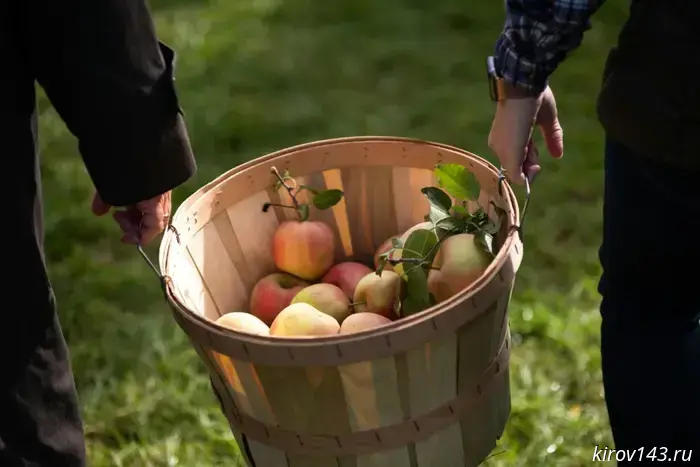
Apple Feast of the Savior: meaning and traditions of the holiday
The Second Feast of the Saviour, popularly called the Apple Feast, falls on August 19 and coincides with the Transfiguration of the Lord, one of the Twelve Great Feasts. On this day services in churches are combined with the blessing of the fruits of the earth, and parishioners at home lay out festive meals from the gifts of nature.
In Rus' the Apple Feast was a special day: in churches the Divine Liturgy was celebrated from the morning and the fruits of the new harvest were blessed: apples, pears, plums, grapes, ears of wheat and honey. It was believed that the blessed apples and ears would guarantee the fertility of the coming year. Blessed apples and ears were kept until the next sowing. People believed that until the apples were brought to the church, to taste them was a sin.
In former times it was strictly forbidden to eat apples before the Apple Feast. The prohibition was especially strict for parents whose children had passed away: it was believed that in the afterlife children whose parents broke the ban would not be given apples. Therefore adults strictly observed the ban on eating apples until the Second Feast of the Saviour. Bereaved parents brought apples to the church and placed them on graves with special reverence, believing that the blessed fruits would become a gift to their children in heaven.
The church feast of the Transfiguration is based on the biblical events when Christ ascended Mount Tabor to pray, taking with him the apostles Peter, John and James. There His disciples saw the Transfiguration of the Saviour: the face of the Lord shone and His garments became dazzlingly white. Standing beside Christ were two prophets — Moses and Elijah — who spoke with Him about the trials that awaited the Saviour in Jerusalem.
What can be done on the Apple Feast
Orthodox tradition advises observing the feast in cleanliness and order. For this reason the house was cleaned on the eve of the Second Feast of the Saviour so that the day itself could be devoted to prayer and thanksgiving. Work in the garden or around the household was postponed, but preparing the festive meal was permitted. Visiting the church was considered of utmost importance. Without prayer and the blessing of the fruits the feast lost its meaning.
It was a particular custom to share apples with the poor, with neighbors and with orphans. Generosity on this day had spiritual significance: the more you give, the more of God’s mercy you receive. Also on the Apple Feast the fast could be somewhat relaxed (the feast falls during the Dormition Fast, which lasts from August 14 to 27): the Church allowed eating fish and drinking a little wine, but overeating and gluttony were strictly condemned.
What must not be done on the Apple Feast
On this day in Rus' there were many prohibitions so as not to desecrate the spiritual sanctity of the feast. Before the blessing of the fruits it was strictly forbidden to taste apples and grapes. Heavy work was prohibited on this day: neither cleaning, sewing, nor garden work was allowed. It was not permitted to celebrate noisily or to indulge in drunkenness. Quarreling and speaking evil words were forbidden. It was not recommended to preserve the harvest for future use: the day was devoted to prayer and thanksgiving. It was forbidden to kill insects, especially bees and butterflies: in Rus' they believed that anyone who laid a hand on them would repel God’s grace.
Другие Новости Кирова (НЗК)
 44 million will be allocated for the improvement of Theatre Square.
The work will cover not only the square itself but also the surrounding areas.
44 million will be allocated for the improvement of Theatre Square.
The work will cover not only the square itself but also the surrounding areas.
 "Mushroom picking" with loud consequences: how not to get lost or poisoned in the forest
The regional Investigative Committee reminded people of simple safety measures that will help them return home from the forest with a basket of mushrooms, rather than in a Ministry of Emergency Situations report.
"Mushroom picking" with loud consequences: how not to get lost or poisoned in the forest
The regional Investigative Committee reminded people of simple safety measures that will help them return home from the forest with a basket of mushrooms, rather than in a Ministry of Emergency Situations report.
 A maintenance campaign at the ammonium nitrate production facility of the KChKhK branch has been completed.
At the KChKhK branch of JSC OHK Uralchem, the repair campaign in the ammonium nitrate production shop has been completed. Repairs were carried out on both units.
A maintenance campaign at the ammonium nitrate production facility of the KChKhK branch has been completed.
At the KChKhK branch of JSC OHK Uralchem, the repair campaign in the ammonium nitrate production shop has been completed. Repairs were carried out on both units.
 Kirov will not become the cultural capital.
The public vote for the title "Cultural Capital 2027" revealed the frontrunners, but Kirov did not make it to the finals of the competition. Chelyabinsk, Vologda and Novosibirsk received the most votes.
Kirov will not become the cultural capital.
The public vote for the title "Cultural Capital 2027" revealed the frontrunners, but Kirov did not make it to the finals of the competition. Chelyabinsk, Vologda and Novosibirsk received the most votes.
 Russian Post was fined 230 million rubles for violating the terms of branch modernization.
The magistrate's court of Moscow found JSC Russian Post guilty of an administrative offense for inaccurate reporting and failure to meet deadlines for modernizing branches in rural and hard-to-reach areas.
Russian Post was fined 230 million rubles for violating the terms of branch modernization.
The magistrate's court of Moscow found JSC Russian Post guilty of an administrative offense for inaccurate reporting and failure to meet deadlines for modernizing branches in rural and hard-to-reach areas.
 In Kirov, a scooter rider hit a three-year-old girl and fled the scene.
A criminal case has been opened in connection with the injury of a minor girl after she was struck by a scooter rider.
In Kirov, a scooter rider hit a three-year-old girl and fled the scene.
A criminal case has been opened in connection with the injury of a minor girl after she was struck by a scooter rider.
Apple Feast of the Savior: meaning and traditions of the holiday
On August 19 the Apple Feast of the Savior is celebrated, which in the church calendar is called the Transfiguration of the Lord.
